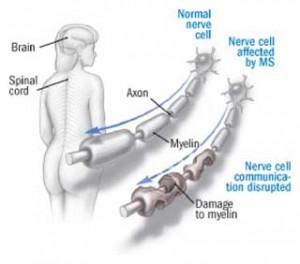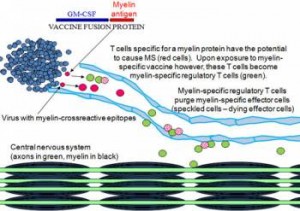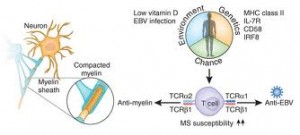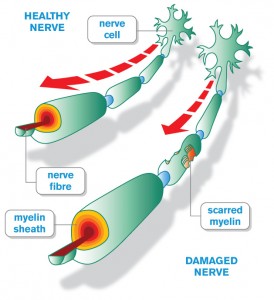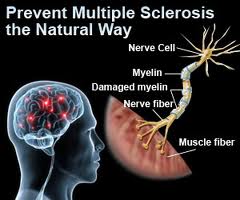A new study was recently released that showed that MS is a multifaceted disease. A significant number of people without multiple sclerosis have narrowing of their neck veins. There is a new theory that chronic cerebrospinal venous insufficiency due to narrowing of veins outside the skull may be responsible in causing MS in a significant percentage of patients. Using venograms in MS patients and in controls without MS a recent study from the University of British Columbia, Vancouver, BC showed that normal controls also had narrowing of neck veins and the authors felt that this invalidated the vascular theory of MS. This story is based on this Lancet publication.
Brain oxygenation is what counts
What was not mentioned in this publication was that venous blood flow on the surface of the brain can get obstructed inside the skull. It’s all about brain tissue oxygenation; if the brain gets enough oxygen, all is well. If there were a lack of perfusion due to venous congestion inside or outside the skull, the patient would be in trouble. I will discuss this further below.
In this blog I will discuss first how to diagnose MS, then mention some newer studies about neck vein circulation with SPECT scanning. I will then review various causes of MS and return to a discussion of the Vancouver study from above.
How MS is diagnosed
The physician can combine a number of tests to diagnose MS. This includes the patient’s symptoms such as balancing problems, double vision, memory problems, fatigue etc. Neurological examination, imaging studies like MRI scanning, lumbar puncture to examine the cerebrospinal fluid and evoked potential studies is what a neurologist orders. The physician requires all of these findings to decide whether the criteria for making a diagnosis are in keeping with all the symptoms of MS. In 2001 an international neurological panel developed the McDonald criteria for diagnosing MS, which were revised in 2010.
Newer ways diagnosing perfusion problems in MS patients (SPECT scan)
One of the newer functional scans is a SPECT scan. It shows areas where there is a lack of blood supply to the brain, but can also identify areas where too much blood circulates. Here is a site where the technique of the SPECT scan is reviewed in more detail.
SPECT scan results in MS patients
SPECT scans in MS patients showed a significant reduction in blood flow to the frontal lobes and to the left temporal lobe. Reduced activity of the left temporal lobe on SPECT scans correlated with MS patients having a deficit in verbal fluency and having a problem with verbal memory. This indicates that a reduction in blood flow to these areas of the brain associates with developing MS.
Perhaps a SPECT scan of the brain (which is where the action of MS is) may be a better indicator for MS than looking for veins in the neck by ultrasound or venograms, as SPECT scans look directly at brain perfusion. The question is whether these blood circulation problems in MS patients may cause deficiencies in the brain of oxygen, nutrients and possibly of other internal mediators.
Known causes of MS
There are a number of known causes of MS, which I will review below.
Autoimmune disease
As this link shows, MS is a disease due to inflammation of the brain. The area where there is inflammation leads to demyelination from loss of the myelin sheaths, which causes the white lesions visible on MRI scans of the brain. One such cause is an allergy to wheat and wheat products. Gliadin antibodies and anti-tissue transglutaminase antibodies were positive in a significant number of MS patients, but not in controls. This suggests at least in part that immunological causes are at play. I agree with this blog that describes that there is significant evidence that gluten intolerance can lead to MS and the positive tests that were found by researchers are likely just the tip of the iceberg.
Overlap of celiac disease and MS
Dr. William Davis describes in Ref. 1 and 2 that you can have celiac disease with no gut symptoms, in other words a person can develop autoimmune symptoms from gliadin and gluten sensitivity without diarrhea or bowel cramps. Dietary lectins, particularly the ones found in wheat lead to leaky gut syndrome and subsequently to autoimmune diseases. One of these autoantibodies can cause MS by destroying the myelin sheath. In a mouse model Mayo Clinic researchers have shown that an antibody injection can be used to block autoantibodies against the myelin sheath. Investigations are ongoing with regard to whether this type of treatment would work in humans as well.
Genetic factors
It is known that a human leukocyte antigen (HLA -DRB1) shows an association with the risk for developing MS. Caucasians have a higher risk of developing MS and they also carry the HLA-DRB1 antigen more often. Another genetic factor is a variation of the IL7R gene. You can read about it under the HLA-DRB1 link. On average the risk of getting MS in the general population is about 10 to 20%.
Nutrition and dietary factors
It has been described that vitamin D3 levels when obtained from in MS patients are low. Vitamin D3 can prevent against MS to a certain degree, so does sun exposure. In countries where malnutrition is common, MS occurs more often.
According to Dr. Terry Wahls who is a clinical professor of medicine at the University of Iowa Carver College of Medicine, a diet of vegetables, fruit, meat, no grain, no dairy, no sugar, no corn and no potatoes can cure MS. Dr. Wahls herself had severe MS in the past and cured it with the help of this diet!
Infections
Certain infections can cause MS. Probably the best correlation was found between the mononucleosis virus (Epstein Barr virus) and the later development of MS.
Chronic cerebrospinal venous insufficiency
According to Dr. Zamboni from Italy clogged veins in the neck can cause MS. Dr. Zamboni placed stents into neck veins that showed narrowing. He found that about 50% of MS patients had improvement with the placement of stents. This allows the blood from veins around the brain to drain normally. This could improve brain circulation in the areas described above where SPECT scans detected a lack of blood supply to certain parts of the brain.
Discussion of the Vancouver publication
It is important to note that certain areas of the brain were not circulating blood as well as others. SPECT scans depicted the blood circulation of the brain. 50% of patients with chronic cerebrospinal venous insufficiency experienced a cure from MS with simple venous stent procedures. This is remarkable. Sure, the Vancouver researchers found that normal controls also have a significant amount of venous abnormalities in their necks. But this does not explain the successes in those MS patients who got better with a simple venous stunt procedure. We also need to be cognizant that Big Pharma sponsored the Vancouver study researchers.
Measuring brain circulation in MS patients
SPECT scans on both the control groups and the experimental MS groups before and after stent procedures need to be done. This way we know whether the brain circulation following stent procedures improved or not. However, this is what I would have expected to see. In other words more research is necessary by other investigators. The question they need to answer is whether or not the surgical stents provided help. Did the surgical procedure help to normalize their brain circulation or not?
Conclusion
Our knowledge regarding MS is getting more multifaceted as new research is emerging. Diet appears to be a major contributing factor, as vitamin D3 is essential for normal brain function and for a normal immune system. At the same time researchers identified grains and wheat as a cause of MS in a subgroup of patients. Leaky gut syndrome can cause autoimmune antibodies, which subsequently can bring on MS. Avoid the foods Dr. Wahls described as being causative in developing MS and you can improve MS remarkably or get cured. The same is true for avoidance of wheat and wheat products as Dr. Davis described.
Multifaceted causes of MS
In my opinion not every MS patient benefits from a stent, but vitamin D3 deficiency or a history of mononucleosis infection in the past does not explain the causation of every MS case. We simply do not have all of the answers yet. But we do have enough information to thoroughly investigate MS patients; the treating physician will then use clinical judgment to decide which treatment would be the most suitable one for an individual MS patient.
More information on multiple sclerosis: http://nethealthbook.com/neurology-neurological-disease/multiple-sclerosis/
References
1. Stern: Massachusetts General Hospital Comprehensive Clinical Psychiatry, 1st ed. “DSM-IV SUBTYPES OF MDD”. Copyright © 2008 Mosby
2. William Davis, MD: “Wheat Belly. Lose the Wheat, Lose the Weight, and Find Your Path Back to Health”. HarperCollins Publishers LTD., Toronto, Canada, 2011.
3. William Davis, MD: “Wheat Belly Cookbook. 150 Recipes to Help You Lose the Wheat, Lose the Weight, and Find Your Path Back to Health”. HarperCollins Publishers LTD., Toronto, Canada, 2012.
Last edited Nov. 7, 2014
